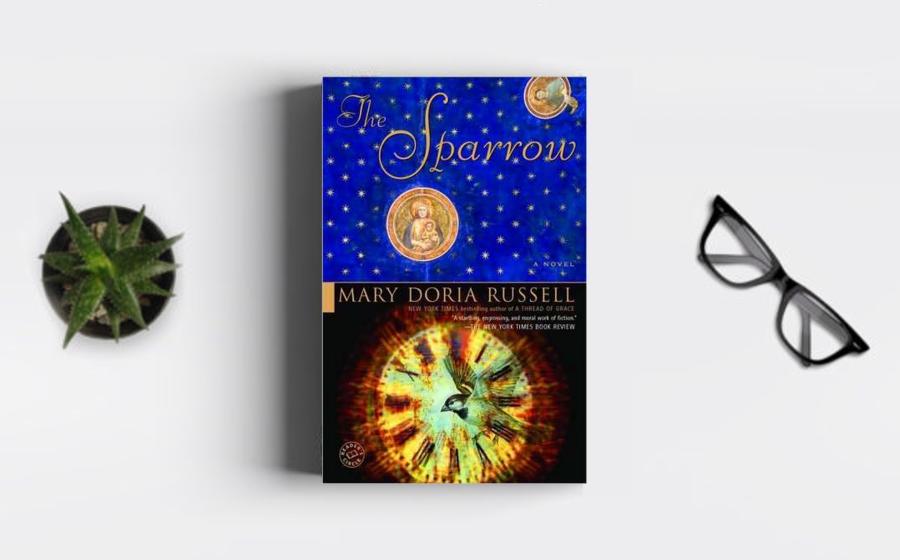"The Sparrow," published in 1996, stands as a
groundbreaking work of science fiction that transcends
traditional genre boundaries. With its masterful
storytelling and thought-provoking exploration of faith,
morality, and the consequences of first contact, the
novel offers readers a profound and emotionally charged
journey into the unknown. Set against the backdrop of a
distant alien world and framed by theological and
philosophical inquiries, "The Sparrow" pushes the
boundaries of science fiction, challenging readers to
grapple with the complexities of human nature and the
pursuit of understanding in the face of the unknown.
The narrative unfolds in two timelines, alternating
between the near future on Earth and the unfolding
events on the distant planet Rakhat. The story is
centered around Father Emilio Sandoz, a Jesuit priest,
and a diverse group of individuals who embark on a
journey to Rakhat in response to the discovery of
mysterious extraterrestrial music. As the narrative
progresses, the novel explores the aftermath of the
mission and the profound impact it has on Sandoz, both
physically and spiritually.
One of the
groundbreaking elements of "The Sparrow" is its thematic
exploration of faith and the complexities of human
belief systems. By placing a Jesuit priest at the center
of a mission to make contact with an alien civilization,
Russell crafts a narrative that delves into the
intersections of religion, morality, and the quest for
understanding. The novel challenges traditional science
fiction tropes by emphasizing the spiritual and ethical
dimensions of space exploration, inviting readers to
reflect on the role of faith in the exploration of the
unknown.
Russell's portrayal of Father Emilio
Sandoz is a masterstroke in character development.
Sandoz, initially a man of unwavering faith, undergoes a
harrowing transformation as the events on Rakhat unfold.
His internal struggles, spiritual crisis, and the
profound trauma he experiences challenge traditional
notions of heroism and resilience in science fiction.
The depth of Sandoz's character adds a layer of
emotional complexity to the narrative, pushing "The
Sparrow" beyond the confines of typical genre
conventions.
The novel's depiction of first
contact is also groundbreaking in its emphasis on
cultural sensitivity and the potential consequences of
interstellar communication. Russell delves into the
linguistic, social, and ethical challenges of
encountering an alien civilization with its own complex
cultural and religious framework. The author's
meticulous attention to detail in portraying the
intricacies of communication and the potential for
misunderstandings adds a level of realism to the novel's
speculative premise. This emphasis on the cultural and
linguistic aspects of first contact distinguishes "The
Sparrow" as a work that goes beyond the typical
portrayal of alien encounters in science fiction.
The structure of the narrative, with its alternating
timelines, adds a layer of suspense and complexity to
the storytelling. Russell skillfully interweaves the
events on Rakhat with the aftermath on Earth, gradually
revealing the fates of the characters and the tragic
outcomes of the mission. This non-linear approach to
storytelling contributes to the novel's uniqueness
within the science fiction genre, creating a narrative
that is as much about reflection and consequences as it
is about the events themselves.
The novel's
thematic depth extends to its exploration of morality
and the consequences of human actions. "The Sparrow"
challenges readers to confront the moral complexities
inherent in the pursuit of knowledge and the potential
consequences of well-intentioned endeavors. The
narrative raises questions about the ethical
responsibilities of explorers, the impact of cultural
imperialism, and the moral dilemmas that arise when
confronting the unknown. These moral quandaries
contribute to the novel's groundbreaking nature, as it
prompts readers to engage with philosophical and ethical
questions beyond the scope of traditional science
fiction.
Russell's incorporation of linguistics
and the study of language as a central element of the
narrative is another groundbreaking aspect of "The
Sparrow." The characters' efforts to decipher the alien
language and understand the cultural nuances of the Runa
people on Rakhat highlight the importance of language in
shaping our perceptions of reality and building
meaningful connections. This linguistic focus adds an
intellectual dimension to the novel, inviting readers to
contemplate the role of language in human understanding
and the challenges of bridging communication gaps with
extraterrestrial civilizations.
The novel's
impact on the genre is evident in its reception and
influence on subsequent works of science fiction. "The
Sparrow" has been widely praised for its innovative
approach to theological themes, its complex characters,
and its nuanced exploration of the implications of first
contact. The novel has spurred discussions about the
intersection of faith and science fiction, inspiring
other writers to engage with philosophical and
theological questions within the genre.
"The Sparrow" is a groundbreaking work of science fiction that challenges and transcends traditional genre conventions. Mary Doria Russell's exploration of faith, morality, and the consequences of first contact, coupled with her meticulous attention to linguistic and cultural details, sets the novel apart as a thought-provoking and emotionally resonant masterpiece. "The Sparrow" invites readers to reflect on the human condition, the complexities of belief systems, and the moral responsibilities inherent in the pursuit of knowledge. With its profound thematic depth, innovative narrative structure, and impact on the genre, "The Sparrow" remains a groundbreaking and enduring contribution to the landscape of science fiction literature.






